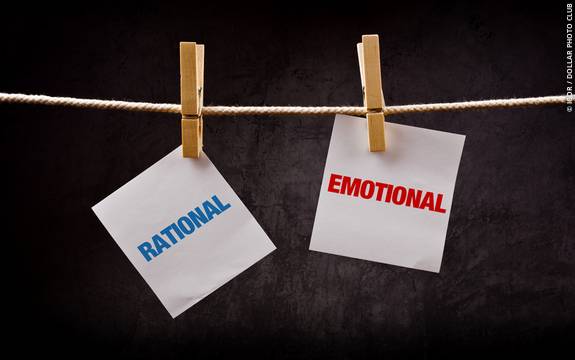Rational Emotive Therapy
Rational Emotive Therapy, sometimes called Rational Emotive Behavioral Therapy, is a form of therapeutic psychology that emerges from behaviorism. It attempts to use reason and rationality to recognize self-defeating cognitive processes, and learn to emote more appropriately. Effectively, the idea is that subconscious destructive behaviors are consciously acknowledged and then subverted in favor of more constructive behavior.
Cognitive Therapies
Mental Wellness Goals of RET
The basic idea behind rational therapy, as it was originally called, was first developed by Albert Ellis in the 1950s. Although Ellis had originally done work in the field of Behaviorism, he would later become convinced of the causal nature of cognitive processes. Specifically, he would develop a model of behavior that involves a continuous interplay between environment and the internal mental state.
In Ellis' view, one's cognitive processes including one's view of life and one's expectations of the world, determine the ways in which one interacts with life. For example, a depressed person might deal with others with a defeated attitude, whereas a non-depressed person might deal with others more confidently and charismatically. Unfortunately, when interactions go poorly (as a result of the attitude with which they were undertaken), that poor outcome can reinforce the problematic attitude, making the issue worse in the future.
For Ellis, the acronym "ABC" offered insights into how to overcome self-defeated behaviors and cognition. The "A" here stands for adversity, which can mean the everyday obstacles and difficulty that everyone is forced to deal with just as a consequence of interacting with the world. The "B" stands for belief, and concerns whether or not the individual in question believes that a positive outcome is possible, or whether or not the adversity really can be overcome. The "C" represents the consequences that arise as a result of the belief. Generally speaking, an individual undergoing some form of rational therapy would be taught that having negative beliefs reinforces and contributes to negative outcomes, and that having positive beliefs about confronting adversity naturally leads to good results.1
Joe Gerstein - SMART Recovery
One of the primary goals of rational emotive therapy is to achieve a state of "mental wellness". Whereas other forms of therapy might have goals such as unearthing repressed psychodynamic conflicts, or identifying periods of intense distress that occurred earlier in life, the idea here is somewhat more abstract, and definitely more "curative".
For the rational emotive therapist, the goal to achieve is a state wherein the client is able to emote and behavior in a manner that is more constructive and perceptive, and permits them a better quality of life. In other words, the goal is to diminish or even totally eradicate the self-destructive beliefs and cognitive processes that lead to disappointing or upsetting interactions with the world.
For many in the field, the key to this goal is a concept known as "unconditional positive regard". The idea is that one treat themselves with a general sense of goodwill and positivity, regardless of any conditions or circumstances. This doesn't mean, naturally, that one avoids self-criticism altogether, but rather simply that one should generally feel as if one is in control of one's life, and that one has the capability to do things well and achieve positive outcomes in the face of adversity.
"Mental wellness", as the rational emotive therapist views it, was introduced as an important concept to the field fairly recently, by the founder himself, Albert Ellis.2
Criticisms
While some question the application of psychological therapy techniques outside of a controlled clinic setting, rational emotive therapy has had a lot of success in the area of addiction recovery. In particular, the organization SMART Recovery, has been using rational emotive therapy principles in their practice for decades now, to great success.
Joe Gerstein, the founder of SMART Recovery, attempts to identify the self-destructive beliefs that "sabotage" client's interactions with the world, and to help them readjust their expectations and approach to life. Billed often as a secular alternative to Alcoholics Anonymous and similar twelve step programs, SMART Recovery has met with its share of success.
Conclusion
Rational Emotive Therapy, like most cognitive behavior therapies, has met with a great deal of criticism over the years. For example, many claim that the discipline as a whole is too rational, and that it "overlooks the emotions". For founder Albert Ellis, this is an absurd proposition. Ellis holds forth that emotion and thought are intricately related to one another, and that one can't divorce one from the other. In other words, by increasing one's rationality, one controls one's emotional problems.
Additionally, many have indicated that rational emotive therapy tends to have the most success when dealing with depression or any of the varying neuroses. By contrast, psychotic disorders such as schizophrenia have proven much more resilient. In fact, there is very little evidence that behavior-oriented therapies such as this one have any impact at all upon schizophrenia.
Evaluation
- Rational Emotive Therapy was founded by Albert Ellis as an attempt to help people improve their behaviors by controlling their cognitive processes.
- Ellis famously used the "ABC" model to explain his discipline, with the A standing for the adversities one faces, B for the beliefs one has about those adversities, and C for the consequences that stem from those beliefs.
- A fundamental idea of Rational Emotive Therapy is that cognition influences our interactions, and that those interactions reinforce our underlying beliefs (and cognition).
- For most rational emotive therapists, the goal is a state known as "mental wellness". When one is mentally well, one's beliefs allow one to react to adversity with confidence and flexibility, permitting constructive rather than destructive interactions with the world.
- Some psychologists such as Joe Gerstein have found rational emotive therapy to be useful in overcoming addiction.
- Critics sometimes claim that rational emotive therapy is too rational and overlooks the emotions. Ellis refutes this and says instead that thought and emotion are too interconnected for such a claim to even make sense.



























